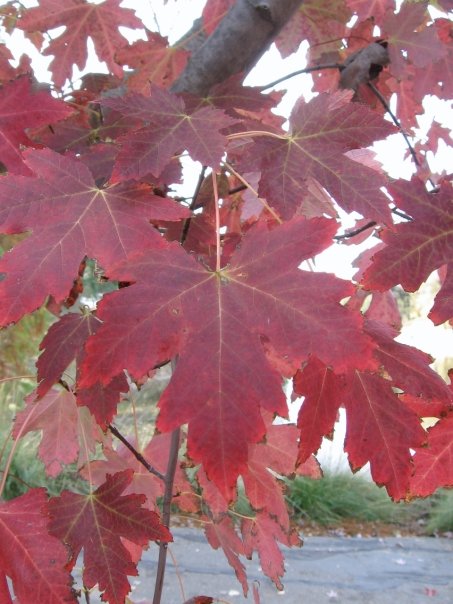When I was a kid, our house had two large Liquidambar trees in our front yard. I loved watching the green leaves change color each year. In mild winter years the leaves turned golden with hints of orange, in colder years the leaves turned red and purple.
Liquidambar Features
One unpopular feature about sweet gum are the seed pods, also called “sticker balls,” “burr balls,” and “monkey balls.” Although striking looking while hanging on the tree, as a kid they made jumping in raked leaf piles painful. Luckily, a variety called L. styraciflua ‘rotundiloba’ is available. It has rounded leaves, produces the same fall color but lacks the “balls” of the original variety.
Sweet Gum Varieties
Fall color in neighborhood.
If you don’t mind the seed pods, there are several varieties of sweet gum to choose from. Visit your local nursery or garden center and ask a certified nursery person about them. Interestingly, some varieties are more likely to turn purplish colors in fall while others have orange and yellow hues. ‘Palo Alto’ is a great variety to grow in California.
In California, not many pests and diseases bother Liquidambar, making it a low-maintenance tree. It does however, need to be trained and pruned while young. Read Landscape Gardening: Tree Training and Pruning https://www.anneofgreengardens.com/gardening-topics/landscape-gardening/tree-training-and-tree-pruning/ if you decide to plant one.
Liquidambar is not for every landscape, however. Most varieties grow to over 50 feet tall. This tree should not be planted close to buildings, sidewalks or power lines and needs considerable space to grow.
If you have a yard with adequate space for a tall, statuesque tree, definitely consider the liquidambar.
| USDA Zones: 6-10 Height: 60′ Width: 25′ Sun/Shade: Full Sun Water Requirements: Moderate to Regular Water Plant Spacing: 40-50′ |
Originally Published:December 13, 2010
Updated:September 29, 2016
Comments
comments
